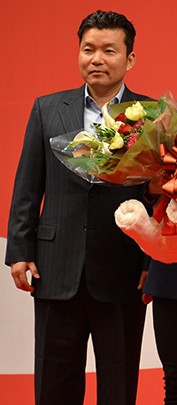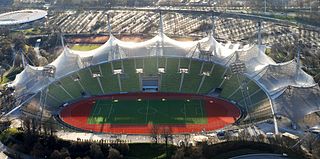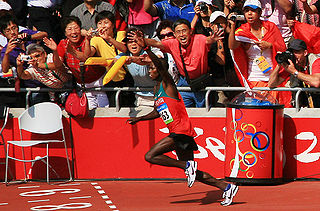
The Honolulu Marathon is a marathon in Honolulu, Hawaii, first held on December 16, 1973. It is one of the world's largest marathons, taking place annually on the second Sunday in December. The marathon is popular for its location in Hawaii, and is also popular among first-time marathoners, many of whom are visitors from Japan.

Hwang Young-cho is a former South Korean athlete, winner of the marathon race at the 1992 Summer Olympics and 1994 Asian Games.
Josia Thugwane is a South African retired long-distance runner, best known for winning the gold medal in the marathon at the 1996 Summer Olympics. Thugwane, who is of Ndebele heritage, is the first black athlete to earn an Olympic gold for South Africa.

The Men's marathon at the 2004 Summer Olympics took place on August 29 in the streets of Athens, Greece where one hundred and one athletes from 59 nations competed. The event was won by Stefano Baldini of Italy, the nation's first victory in the event since 1988 and second overall. The United States reached the podium in the event for the first time since 1976 with Meb Keflezighi's silver. Vanderlei de Lima took bronze, Brazil's first-ever medal in the men's marathon.
Erick Wainaina is a Kenyan marathon runner, who won an Olympic bronze medal in 1996 and a silver medal in 2000. He finished seventh in the 2004 Summer Olympics marathon in Athens, making him one of the few athletes in Olympic history to finish in the top 10 at three separate marathons.

Cape Verde sent a delegation to compete at the 2000 Summer Olympics in Sydney, Australia from 15 September to 1 October 2000. This was Cape Verde's second appearance at a Summer Olympic Games after the 1996 Summer Olympics in Atlanta four years prior. The Cape Verdean delegation to Sydney consisted of two track and field athletes, Isménia do Frederico and António Zeferino, who were both making their second Olympic appearance. Do Frederico did not advance out of her heat in the women's 100 meters, while Zeferino finished 67th of 81 finishers in the men's marathon.

Malawi sent a delegation to compete at the 1996 Summer Olympics in Atlanta, United States from 19 July to 4 August 1996. This was the African nation's fifth appearance at a Summer Olympic Games. The Malawian delegation consisted of two competitors in the sport of athletics; Henry Moyo failed to advance past the first round heats of the 5,000 meters, and John Mwathiwa finished 65th in the marathon.

The men's marathon race of the 1908 Summer Olympics took place in London on 24 July 1908. Johnny Hayes won after Dorando Pietri was disqualified for having received assistance before the finish line. For the first time in an Olympic marathon, the distance was 26 mi 385 yd (42.195 km), which would become the standard distance in 1921. 75 competitors entered the race, of whom 55 from 16 nations started, with 27 from 11 nations finishing. NOCs could enter up to 12 athletes. The United States and South Africa each won their first Olympic marathon medals.
The men's marathon at the 1988 Summer Olympics in Seoul, South Korea was held on Sunday October 2, 1988. The race started at 14:30h local time. A total of 98 athletes completed the race, with Polin Belisle from Belize finishing in last position in 3'14:02. There were 118 competitors from 60 countries. Twenty of them did not finish. The maximum number of athletes per nation had been set at 3 since the 1930 Olympic Congress. The event was won by Gelindo Bordin of Italy, the nation's first victory in the Olympic men's marathon and first medal in the event since 1924. Kenya and Djibouti each won their first Olympic men's marathon medal.

The men's marathon at the 1972 Summer Olympics in Munich, West Germany was held on Sunday September 10, 1972. The race started at 15:00h local time. There were 74 competitors from 39 countries. Twelve of them did not finish. The maximum number of athletes per nation had been set at 3 since the 1930 Olympic Congress. The event was won by Frank Shorter of the United States, the nation's first Olympic marathon victory since 1908 and third overall. Karel Lismont won Belgium's second medal in the marathon with his silver. Mamo Wolde of Ethiopia became only the second man, after his countryman Abebe Bikila, to win two medals in the marathon. Ethiopia's four-Games medal streak was matched only by Finland (1920–1932).

The men's marathon at the 1992 Summer Olympics in Barcelona, Spain, was held on Sunday August 9, 1992. The race started at 18:30h local time. One hundred and ten athletes from 72 nations started; 87 athletes completed the race, with Pyambuugiin Tuul from Mongolia finishing in last position in 4:00:44. The maximum number of athletes per nation had been set at 3 since the 1930 Olympic Congress. The event was won by Hwang Young-Cho of South Korea, the nation's first Olympic men's marathon medal. Koichi Morishita's silver was Japan's first medal in the event since 1968. Stephan Freigang of Germany took bronze, the first medal for Germany in the event though East Germany had won two golds during partition.

The men's marathon event at the 1928 Summer Olympics took place in Amsterdam, Netherlands on Sunday, 5 August 1928. The race started at 15:14 local time. A total number of 57 athletes completed the race, with Willem van der Steen from the Netherlands finishing in last position in 3:29:21. There were 69 competitors from 23 countries. Twelve of them did not finish. The maximum number of athletes per nation was 6. The event was won by Boughera El Ouafi of France, the nation's first Olympic marathon victory since 1900. Manuel Plaza earned Chile's first Olympic marathon medal, while Martti Marttelin's bronze put Finland on the podium in the event for the third straight Games.

The men's marathon at the 1956 Summer Olympics in Melbourne, Australia was held on Saturday December 1, 1956. There were 46 participants from 23 nations, with 13 runners not completing the race. The maximum number of athletes per nation had been set at 3 since the 1930 Olympic Congress. The event was won by Alain Mimoun of France, the nation's first Olympic marathon victory since 1928 and third overall. Yugoslavia took its first Olympic marathon medal with Franjo Mihalić's silver. Finland returned to the podium in the event for the first time since 1932 as Veikko Karvonen took bronze.
The Closing Ceremony of the 1996 Summer Olympics took place on August 4, 1996, at the Centennial Olympic Stadium in Atlanta, United States at approximately 8:00 PM EDT (UTC−4). It was produced by Don Mischer.

The men's marathon at the 2008 Summer Olympics took place on 24 August at 7:30am in Beijing, ending in the Beijing National Stadium. It was the last time in Summer Olympics history that the start and/or finish of the men's marathon route was located inside the Olympic Stadium. Ninety-five athletes from 56 nations competed. The winner of the event was Samuel Wanjiru of Kenya, who set an Olympic record in the time of two hours, six minutes, and 32 seconds. It was Kenya's first victory in the men's marathon. Morocco won its first medal in the event since 1960, with Jaouad Gharib's silver. Tsegay Kebede of Ethiopia took bronze.

The men's marathon event at the 2000 Summer Olympics took place on 1 October 2000 in Sydney, Australia. One hundred athletes from 65 nations competed. The maximum number of athletes per nation had been set at 3 since the 1930 Olympic Congress. The event was won by Gezahegne Abera of Ethiopia, the nation's first victory in the event since winning three in a row from 1960 to 1968. Ethiopia's fourth gold medal in the men's marathon moved it out of a tie with France and the United States into sole possession of the most men's marathon gold medals. Ethiopia also became the first nation to have two medalists in the men's marathon in the same Games since South Africa did it in 1912, as Tesfaye Tola took bronze. Kenya won its third men's marathon medal in four Games with Erick Wainaina's silver. This made Wainaina the sixth man to earn two medals in the event, after his bronze in 1996.

The men's marathon at the 1980 Summer Olympics in Moscow, USSR had an entry list of 76 competitors, with 74 athletes from 40 nations starting and 53 runners finishing the race held on Friday 1 August 1980. The maximum number of athletes per nation had been set at 3 since the 1930 Olympic Congress. The event was won by Waldemar Cierpinski of East Germany, the second man to successfully defend Olympic gold in the marathon. Both the Netherlands and the Soviet Union won their first men's Olympic marathon medals.

The men's marathon at the 1960 Summer Olympics in Rome, Italy, was held on Saturday September 10, 1960. There were 69 participants from 35 nations. The maximum number of athletes per nation had been set at 3 since the 1930 Olympic Congress. Abebe Bikila, who ran the race barefoot, finished in world record time and became the first sub-Saharan African to win an Olympic gold medal. All three of the medalists came from nations which had never before won an Olympic marathon medal.

The men's marathon event at the 1948 Summer Olympic Games took place on August 7. Forty-one athletes from 21 nations competed. The maximum number of athletes per nation had been set at 3 since the 1930 Olympic Congress. The race was won by Delfo Cabrera of Argentina, the nation's second victory in three Games. Tom Richards's silver medal put Great Britain on the podium for the third time in a row, while Étienne Gailly earned Belgium's first marathon medal with his bronze.

The men's marathon at the 2012 Olympic Games in London took place on the Olympic marathon street course on 12 August, the final day of the Games. One hundred and five athletes from 67 nations competed. The event was won by Stephen Kiprotich of Uganda, the nation's first Olympic men's marathon victory and the nation's only medal in 2012. Kenya earned its fourth and fifth medals in five Games, with Abel Kirui's silver and Wilson Kipsang's bronze.

















